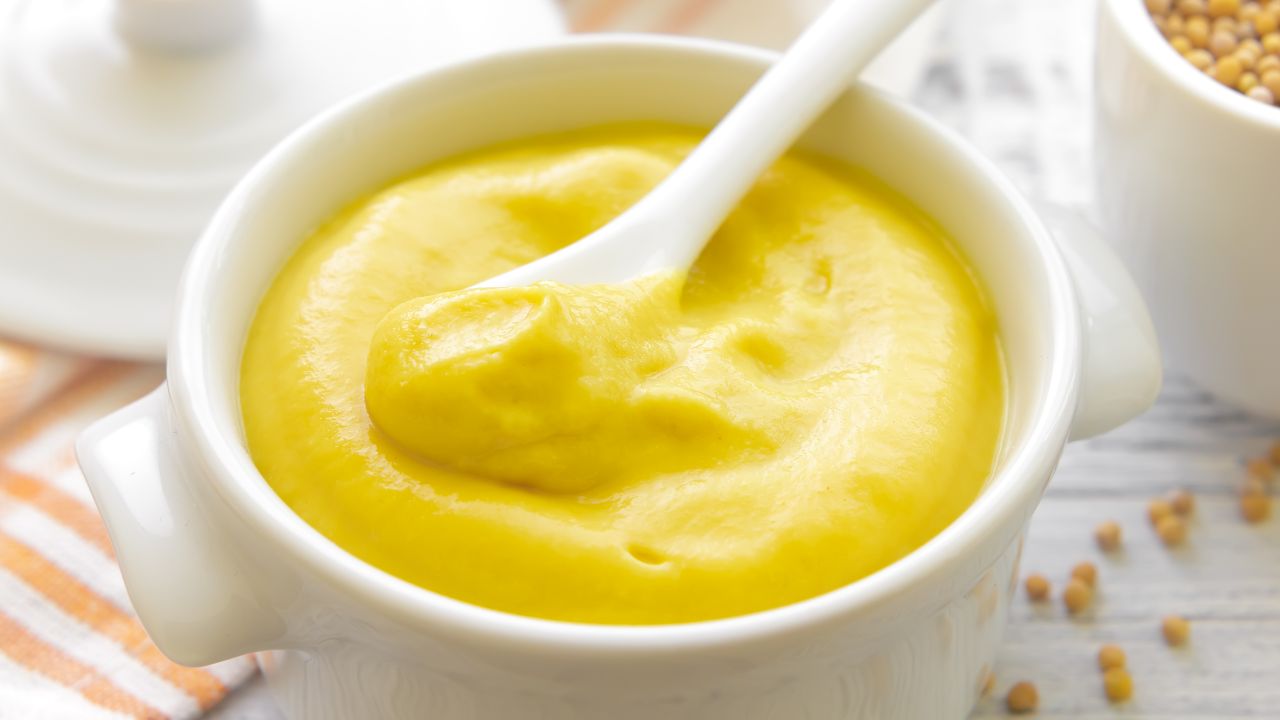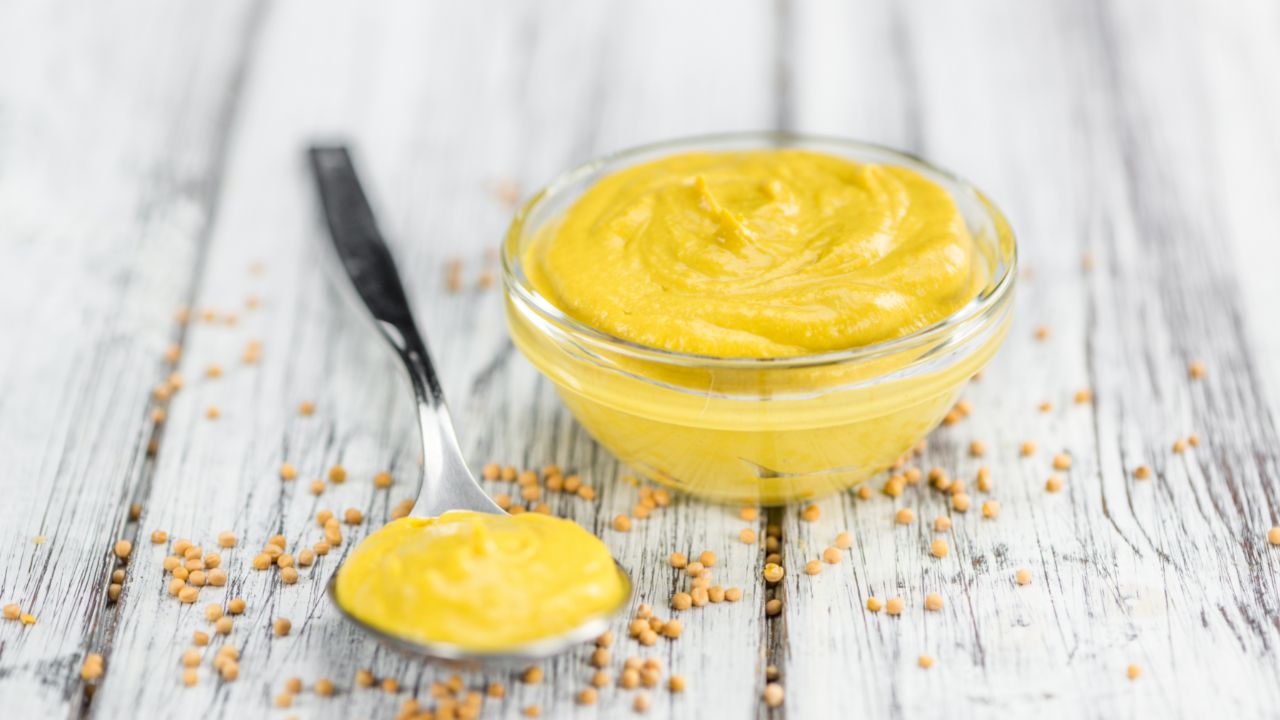Do you want to know if your mustard needs to be refrigerated? In this article, we have the answer!
Let’s face it, many of us have a habit of storing items in our kitchen cupboards for an unknown amount of time.
If you enjoy trying new things in the kitchen as much as we do, you probably wind up with an excessive number of containers and jars filled with various condiments and sauces.

One of them is definitely mustard, and if you are like us, then you use it like crazy every single day for a week and then simply forget it behind the rest of the condiments for months.
But when it is time to have some again after months have gone by, is it safe to do so? Does mustard go bad if you keep it outside the fridge?
All these questions will be answered below, so keep on reading to find out whether it requires refrigeration, how to store it, and what should be done if it begins to dry out or dissolve.
Does Mustard Need To Be Refrigerated?
Well, it’s not a clear yes or no. Mustard, like tomato sauce, is acidic and will stay fresh for a longer time than other sauces.
If you expect to use all your mustard over the next couple of months, you can store it in a dark place like a cupboard so that it can stay at room temperature without being warmed up by the sun’s warmth.
If you are uncertain of how often you will be using it, it’s best to keep it in the fridge to be on the safe side.
Keep in mind that the jars or bottles you store your mustard should have a lid and be firmly closed.
If the containers are not well-sealed, your mustard may dry out or let the atmosphere’s moisture get in.
The most important thing, however, is not to start dipping food in the container.
Instead, pick a spoon to add some mustard on your hotdog or a plate to avoid any bacteria entering the container and ruining your mustard.
So, as previously stated, the answer is not so transparent. Does mustard need to be refrigerated? No, it doesn’t.
Should you, even so, store mustard in the refrigerator? Yes, especially when you wish to preserve its best flavors.
Which Mustard Is Best Refrigerated?
Dijon mustard will end up losing its unique flavors if not stored in the fridge, so it’s highly advised that you refrigerate it.
The same goes for the horseradish mustard, whose strong taste and aromas become milder when you keep it at room temperature after a couple of months.
Nevertheless, French Mustard seems to be perfectly fine when left at room temperature and can even be consumed at that temperature.
So, if you don’t mind the lack of coolness in your mouth, you can have it that way.
That’s not to say that some mustard connoisseurs will not notice the difference between French mustard when it is stored in the fridge and in the pantry.
But, unlike the other two examples above, the difference is not that significant.
Generally, if you go through some mustard brand websites or even have a look at their labels in the supermarket, you will see that most, if not all of them, have the same note: “Refrigerate after opening.”
As a result, no matter what kind of mustard you have, whether it’s a store-bought horseradish or a homemade Dijon, it’s best to refrigerate it if you intend to consume it within a period of 2-3 months.
Does Mustard Have An Expiration Date?
Since standard mustard does not go bad, several manufacturers mark their bottles with a “Best By” date instead of an “Expiry Date.”
What is the distinction?
An expiry date marks the point at which components of the mustard begin to deteriorate, potentially resulting in health risks to whoever consumes the product after that date.
A “Best By” date, on the other hand, simply indicates when the taste and freshness will begin to deteriorate.
So, to put it simply, mustard can go bad, but the actual date it will do so is unknown.
How Long Can I Store Mustard In The Fridge For?

Even when not stored in the fridge, an unopened bottle of mustard can remain fresh for years!
This is due to the fact that mustard is composed of mustard seeds, lemon juice, and vinegar, all of which have a long shelf life.
That is pretty evident by how we store many foods in vinegar or lemon juice to keep them fresh.
Any microbes that enter your bottle of mustard, like many other foods, will speed up its process of going bad.
When the mustard bottle is unsealed and left open for a long time, air goes in it and it is more likely to dry out, separate, or lose a part of its flavor profile.
However, when it is in a sealable container and you only use unused spoons for dipping, it is safe for consumption.
Therefore, do your best to keep it firmly closed, be knowledgeable of product safety, and avoid dipping food in the container you are storing the mustard in.
When stored in the fridge, it should last even longer. And yet, the type of mustard you have will also determine how quickly it will spoil.
For example, Dijon mustard has the longest shelf life, lasting for up to three years if never opened and a year when used and refrigerated.
Following that is American mustard and Chinese mustard, both of which can be enjoyed for approximately two years when never opened and a year when used and refrigerated.
Any mustard you buy in the supermarket will almost certainly have an expiry date, so when you cannot tell if it’s gone bad or not, rely on that date and get rid of it to avoid getting an upset stomach or worse.
As a general rule of thumb, if the mustard looks different in color, has a bitter taste, or has an ‘off’ odor, it’s probably a good idea to discard it!
Tips For Storing Your Mustard
As previously mentioned, mustard should be stored in a cool, dry place that is not exposed to direct sunlight.
If you use mustard frequently and will finish a bottle of it within a couple of months, you can store it in the kitchen cupboard.
This is the reason ketchup and mustard are almost always present on restaurant tables.
With so many people coming and going, it’s a matter of days for most restaurants to empty and replace those bottles.
As a result, it is not necessary to put them in the fridge. If you are unsure of the amount you will use, it is best to refrigerate your mustard to prolong its storage life.
Should you need it, you will sometimes need to allow it to rest and reach room temperature before using it.
If you’re storing your mustard in the kitchen cupboard or the refrigerator, keep in mind that the lid or cap should be firmly closed so that your mustard won’t oxidize or dry out.
What Should You Do If The Mustard Goes Dry?
If mustard is left open for a long period of time, it will go dry.
However, there is no need to panic as a teaspoon of vinegar (or a bit more, depending on how much mustard you have left) and some stirring in between each teaspoon you are adding will do the work.
Make sure to stir it well so that it won’t dilute in the vinegar and add only a teaspoon at a time and the texture will return to normal.
In case it still comes off dry and you needed to add far too much vinegar that ruined the flavor, you’ll have to buy or make another mustard!
What Should You Do If The Mustard Separates?
You could perhaps assume that separating mustard indicates it is now spoiled.
Well, it might be, but it is probably not given that you have stored it the right way by keeping the bottle firmly closed and following all the food safety advice we gave you.
Mustard will inevitably separate if it has not been shaken or used for a while, but you need to do nothing more than simply give it a good stir with a spoon.
You will see that it will instantly return to its previous texture.
The Bottom Line
It is obvious that the decision to refrigerate your mustard or keep it in the cupboard is entirely yours.
Even though you might lose some of its taste and texture if you choose not to keep it refrigerated, it certainly will not be an issue if your family or flatmates consume sauces at a rapid pace.
- 15 Traditional Greek Breads - July 31, 2023
- 30 Delicious And Gluten-Free Cookie Recipes - July 29, 2023
- 30 Of The Best European Desserts - July 29, 2023
